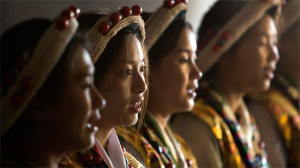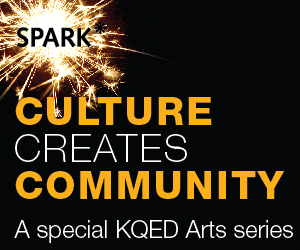Keeping Tibetan Traditions Alive in the East Bay

Keeping Tibetan Traditions Alive in the East Bay
On a recent afternoon, about a dozen high school girls sit cross legged in a courtyard outside the Tibetan Association of Northern California (TANC). They have an hour and a half to learn a musically complex Tibetan ceremonial song, Gyalway Tenshu, that they will perform for the man they refer to as His Holiness.
 Tibet’s spiritual leader, the Dalai Lama, is coming to the Bay Area for a long-anticipated visit. On Sunday, he’ll give a public lecture in Berkeley. The group of Tibetan American teenagers is among those making feverish preparations.
Tibet’s spiritual leader, the Dalai Lama, is coming to the Bay Area for a long-anticipated visit. On Sunday, he’ll give a public lecture in Berkeley. The group of Tibetan American teenagers is among those making feverish preparations.
Their teacher Tashi Tsering plays along on a turquoise, seven-string Tibetan lute called a dramnyen. He chose this song because it is sung exclusively for the Dalai Lama. Another Lama wrote the words years ago. A professor at the Tibetan Institute for Performing Arts in Dharamsala, India set it to a melody that rises and falls.
May His Holiness have a long life.
Bless him and bless us;
Bring peace and love to our people and children.
Some of the girls make English notations in the margins of a paper that’s otherwise covered in Tibetan script. The girls are surrounded by the trappings of 21st century American girlhood — cell phones and bright plastic bags from fashion stores like Forever 21. But they also spend hours each weekend learning the Tibetan language and culture.
One of them is 17-year-old Tenzin Nyima. She says the Tibetans in Tibet wouldn’t have the opportunity to even speak the Tibetan language, let alone sing this song. “Tibetans in Tibet can’t do what I’m doing right now,” she says, “practicing my own culture, language and religion.”
Nyima moved here from India about five years ago. The El Cerrito High School junior says whether the music is about religion or folkways, it carries political weight because of repression in Tibet by governing Chinese authorities. Nyima’s childhood was filled with tales of the Chinese repression told to her by her grandparents and her mother, who fled Tibet. “She would tell me stories about [how] she was in prison and was tortured, and how she came to India” recalls Nyima. She says this makes her feel connected to the Tibetans’ plight.
The president of TANC says about 2,000 Tibetan Americans now live in the East Bay. Many of them emigrated from Nepal and India, where they fled following the Dalai Lama’s exile to Dharamsala in 1959.
Albany High School junior Nawang Chokyi says her parents worried she might lose her connection to Tibet. So after she was born in Oakland, they sent her to spend her first 10 years living with relatives in a Tibetan community in India. “If we just come [to the US] and we’re not trying to preserve our culture, then who are we? What are we?” asks Chokyi.
Nyima’s father works the night shift at a large produce market along with other Tibetans, including the girls’ music teacher, Tashi Tsering. In the two and a half years that he has mentored the group, they have competed in music, dance and Tibetan-language debate competitions in Tibetan communities from Seattle to Los Angeles.
Tsering, now 29, started dancing after watching his father dance for the Dalai Lama when the holy figure won the Nobel Peace Prize in 1989. It became his dream to be a Tibetan artist, and he entered the prestigious Tibetan Institute of Performing Arts (TIPA) in Dharamsala, where he studied for over a decade before moving to the United States.
Tsering is far from the only trained Tibetan dancer and musician in the area trying to keep the traditions alive. He is a member of the East Bay’s classical Tibetan dance and opera group called Chaksam-Pa.
Chaksam-Pa was founded in 1989 by a graduate of TIPA who moved to the Bay Area. Now its artistic director, Tsering Wangmo says the group boasts four generations of graduates from TIPA. Chaksam-Pa performs throughout the country, in places like Seattle, Atlanta and recently at the Getty Center in Los Angeles.
Wangmo, along with a Tibetan Buddhism center near Santa Cruz, recently received a large grant from the Creative Work Group to stage an elaborate, hours-long performance called, Lingdro. The piece tells the story of an 11th century Tibetan King. The rare U.S. performance will be held on the Dalai Lama’s birthday this summer.
In preparation, every other weekend Wangmo leads dozens of volunteers from the Tibetan community in rehearsals. On a recent night, 24 men and women stand in a circle, passing the melody back and forth while reading from scripts pulled up on smart phones. The men and women call to the deities, asking them to be present for the performance.
Renzin Lama, a nurse at the University of California at San Francisco, says she first saw this dance as a child in Nepal, when she watched her aunt take part in a performance. Lama says she never imagined she would get the chance to learn it here, and she is gratified other young people may see it and be inspired to learn the tradition.
This generational transfer is the way all Tibetan music is passed along, says Tashi Tsering, the teenage girls’ music teacher. He says in India he and other musicians from the music institute would regularly seek out older people displaced from provinces all around Tibet to learn from them.
“Most of the elders, they are so nice and say ‘come on, let’s sit and have a tea,’ and they start singing and we are recording and then we teach to our junior artists,” says Tsering.
In the United States, he has become the elder, passing on the music of his ancestors. Tsering says performing in Tibet someday is a dream. In the meantime, he and his students have plenty to look forward to when they perform for the Dalai Lama at the Berkeley Community Theatre on February 23, 2014.












